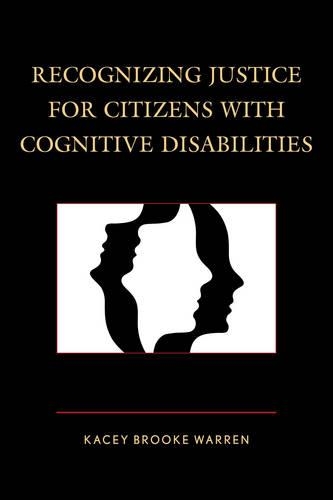
Recognizing Justice for Citizens with Cognitive Disabilities
(Hardback)
Available Formats
Publishing Details
Recognizing Justice for Citizens with Cognitive Disabilities
By (Author) Kacey Brooke Warren
Bloomsbury Publishing PLC
Lexington Books
30th January 2015
United States
Classifications
Tertiary Education
Non Fiction
Disability: social aspects
323.3
Physical Properties
Hardback
212
Width 158mm, Height 236mm, Spine 21mm
449g
Description
Although undeniably subject to the coercive political institutions of a liberal state, citizens with cognitive disabilities have frequently and without justification been denied political equality and political liberty. Rather than opposing this treatment, philosophers have tacitly condoned it, often by silence, and other times by explicitly neglecting the concerns for justice that these citizens have. In Recognizing Justice for Citizens with Cognitive Disabilities, Kacey Brooke Warren searches for a theory of justice that can adequately address these concerns. Students and scholars of philosophy, political theory, and disability studies will benefit from Warrens discussion of four of the most influential contemporary theories of justice and her analysis of which of the four is most promising for extending political equality and political liberty to citizens with cognitive disabilities.
Reviews
This book, Warrens first, is an excellent addition to the growing body of work on philosophical concerns as they relate to persons with cognitive disabilities. The book comprises three parts: 'Liberalism and Cognitive Disability,' 'Four Approaches to Justice for Citizens with Cognitive Disabilities,' and 'Recognizing Justice for Citizens with Cognitive Disabilities.' In the first part, Warren discusses standards and criteria for any liberal theory of justicee.g., workable conceptions of social-political equality, including equal rights and consideration. She also enunciates various conceptions of disability, disentangling notions of disability and impairment, along with medical and social models of each. In part 2, she examines contemporary, influential approaches to these broad concernswork by John Rawls, Martha Nussbaum, Eva Feder Kittay, and Axel Honneth. Warren provides respectful assessments of their work, acknowledging what is valuable in each while offering an even-handed critique. In the final part, she offers a brief, suggestive statement identifying paths and criteria for promoting greater meaningful practice for citizens with cognitive disabilities. Warrens book is thoughtful, careful, thorough, and fair. Summing Up: Recommended. Upper-division undergraduates through faculty and professionals. * CHOICE *
Kacey Brooke Warrens Recognizing Justice for Citizens with Cognitive Disabilities is a concise, accessible introduction to various liberal political theories and the extent to which they are inclusive of citizens with cognitive disabilities. . . .Warrens book is an important and unique contribution to political philosophy and disability studies. Readers will find in Recognizing Justice for Citizens with Cognitive Disabilities a most sustained and thorough analysis of the ability of contemporary theories of justice to address the concerns of cognitively disabled persons. It is recommended for philosophers and those in disability studies. * Marx and Philosophy Review of Books *
In this original and timely book, Kacey Brooke Warren focuses on the political epistemological question of how we can determine what justice requires for citizens with such cognitive disabilities as Down syndrome, autism, and Alzheimers disease. She assesses existing philosophical proposals by two standards: one is the Standard of Presumptive Political Equality; the other is the Liberal Standard of Justification, which requires any justice regime be acceptable to those who fall within its scope. Warren argues that the proposals offered by Rawls, Nussbaum, and Kittay fail these standards. However, she finds promise in Axel Honneths concept of differentiated recognition, and her conclusion builds on this concept to develop an innovative method of political justification based on trust and transparency. Recognizing Justice for Citizens with Cognitive Disabilities is an important contribution to a fast-growing philosophical literature on justice for people with cognitive disabilities.In particular, it offers a groundbreaking sustained examination of a crucial aspect of the issue that has not received the philosophical attention it deserves. -- Alison M. Jaggar, University of Colorado, Boulder
Author Bio
Kacey Warren is lecturer of philosophy at the University of Colorado, Boulder.
